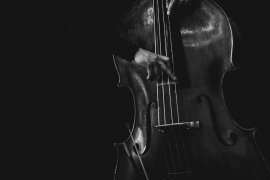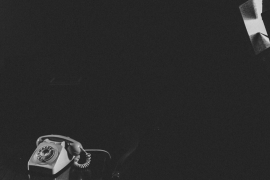1. TWENTY MINUTES INTO WHAT THE HISTORY MAJOR’S DATE—her mother’s friend’s son—had referred to as “the film about lesbians,” a man who’d been sitting at the end of the front row in the theatre stood, lifted two pistols, and shouted, “I am The Waster, come to destroy!” He then fired into the audience of about eight people. It was a matinee. The history major’s mother’s friend’s son also stood, to try and make sense of what was going on, but the history major swiped his legs from under him as she’d learned to do in her karate elective. Her date landed on the concrete with a hard thud, where she joined him for cover. Shots ripped over the film’s soft, contemplative soundtrack. To be honest, the date with her mother’s friend’s son should not have happened, but it was winter, and she had been lonely, and her ex worked at the concession stand. He would have seen them, had he been working that Wednesday, and maybe, just maybe, he would have wanted her back. Now she thought, if she died, he would definitely have wished he hadn’t broken up with her. As The Waster shot into the plush stadium seating, he continued to yell, though nobody was sure if he was actually saying anything. That was, until a brave soul, who’d arrived late, tackled The Waster.
2. The brave soul wasn’t generally considered very brave. Except by a select few. Specifically, seven people. He worked for an apartment complex in Athens, Tennessee, where he spent his days drafting lease agreements and giving tours around the campus in golf carts. Sometimes, he took long lunches and saw matinees that he couldn’t bring his wife and young daughter to see at the regular showtimes. These films were usually about difficult subjects involving, for example, explicit lesbian sex. The day of The Waster, traffic had made him miss the previews (the best part) as well as the first twenty minutes of the film, and so with popcorn and coke in hand, he had entered the theatre in the middle of a shooting spree and acted on instinct, tackling the older man from behind and wrestling the guns away from him as he used to wrestle footballs away from high schoolers in what he considered the more glorious time of his life.
When law enforcement arrived, they interviewed the brave soul, but he couldn’t stay for the photo shoot with the Daily Post Athenian. His regional manager had already called to ask what was taking him so long to check the fences near the edge of the property. And so, as politely as possible, he requested that he not be named in the DPA’s forthcoming article because his boss was one of the older folks who still read the newspaper.
3. The sheriff had heard of The Waster before. Over the past month, several local churches had reported ominous letters signed by such a person and left nailed to their front doors. Forty-three churches, to be precise. There were no explicit threats in the letters, only vaguely biblical phrases—the cold hand of truth . . . try ye not the love of thy congregates, who hath given thee thy power—and multiple, though probably unintentional, misspellings. The sheriff believed it all was an elaborate prank by some disillusioned, yet rambunctious youth.
Nevertheless, the letters were read aloud to the various Methodist and Baptist congregations, followed by a supplicant prayer to the Lord for protection, followed by an afternoon meal in the fellowship hall prepared by several wives. The sheriff didn’t know what to do at these displays of righteous community but show up, accept a healthy plate of chicken casserole and mashed potatoes, and reassure God’s children with his presence.
These concerning developments coincided with the appearance of a man in front of Food City. He was old, with long white hair, a white beard trailing down his front, and he carried with him a large white poster board. Vaxination or EXTRMINATION? the sign read in gangly black sharpie.
4. “Take heed unto thyself, and unto the doctrine; continue in them: for in doing this thou shalt both save thyself, and them that hear thee,” said the Waster, when questioned as to why he did what he did.
He was going to be locked up. Long enough for people to feel relieved, for them to become scared of other things, and most likely, for the remainder of his days. But the sheriff’s department didn’t really think he was a great threat. They had taken his guns, his posterboard. What else could he do? Nobody had been seriously injured except for the young man who busted his nose on the theatre’s concrete floor. And that hadn’t really been The Waster’s fault.
No family, arthritis, possibly undiagnosed dementia—the most the sheriff’s department could gather from him was: for too long, The Waster believed religious piety, sexual purity, and the virtues of hard work were being spat upon by society. There were LIQUOR STORES in the county now, millions of people living solely off WELFARE. “Verily, verily, I say unto THEE, what other explanation will suffice save that the LORD’S flock hath wandered FAR from the hill?”
When he learned that the Athens Movie Palace would be showing the critically lauded lesbian film, he knew this was “the TIME.” And clearly, he had been wrong. Now it was as if The Waster were wasting away, his task unfinished. Or so his defeated disposition—the way he dragged his feet, the loss of any appetite, the subsequent thinning of his body—seemed to indicate.
A few older women wondered if he were a prophet or maybe an angel in disguise come to check up on them. After all, it was the lesbian film that he shot up. Maybe this was the Lord saying enough is enough with all that LGBT-Whatever nonsense. This theory, among others of the supernatural variety, was largely circulated amongst those on front porches with newspapers in hand who sold insurance or owned apartment complexes, worked the large machines at Johns Manville or Waupaca, who were more often than not, easily fascinated.
During his time in the hole, The Waster did have one visitor: a reporter from the student newspaper at Tennessee Wesleyan College, whom he did not recognize. For she had been in the theatre on his day of reckoning, on a date with her mother’s friend’s son, and she wanted to know: of all the debaucherous places—the liquor stores, the welfare office, the shady RV park that she was pretty sure had been converted to a sex-trafficking hub—why a movie theatre? And with cavernous bags dug deep under his eyes, he answered, “…this secret is not revealed for any wisdom that I have more than any living, but for their sakes that shall make known the interpretation to the king, and that thou might-est know the thoughts of thy heart.”
When she asked for clarification, The Waster sighed, and through his exhalation, she felt—well, not peace exactly, but . . . answered.
5. The history major’s mother’s friend’s son, who had busted his nose when he hit the concrete and bled mildly, was studying architecture at another school across the state, and afterwards, he occasionally sent the history major blueprints for escape routes in churches, classrooms, and movie theatres. Hidden passageways in the staircases, altars, beneath desks and projection booths. In order to supplement her bible learning, the history major wrote what she considered important verses as captions beneath the blueprints, framed them, and hung them in her dorm. Her favorite was for the theatre route, accessible from midway up the stadium seating on both sides as well as underneath the projection booth in the back of the theatre: “Fear not; for thou shalt not be ashamed: neither be thou confounded; for thou shalt not be put to shame: for thou shalt forget the shame of thy youth, and shalt not remember the reproach of thy widowhood any more.”
When the history major’s roommate asked about the framed blueprints hanging on their walls, the history major said they were art.
Her leg jittering, she would stare at the frames in the morning with her cup of coffee and replay her mother’s friend’s son’s coming back to the dorms with her on the night they were attacked. As she lay him on the bed, unzipped his skinny jeans, peeled them from his legs, and climbed over top of him, she noticed two dark spots under his left eye, almost perfectly placed on his cheekbone. At first, she thought it was dried blood left over from his earlier nose-bust, but when she licked her thumb and tried to rub them away, she realized that no, they were permanent.
LUKAS TALLENT lives in New York City. His work has recently appeared in On the Run, SORTES, autofocus, and many other places. You can find more of him at lukas-tallent.com.
Like what you’re reading?
Get new stories or poetry sent to your inbox. Drop your email below to start >>>
OR grab a print issue
Stories, poems and essays in a beautifully designed magazine you can hold in your hands.
GO TO ISSUESNEW book release
Ghosts Caught on Film by Barrett Bowlin. Order the book of which Dan Chaon calls “is a thrilling first collection that marks a beginning for a major talent.”
GET THE BOOK



